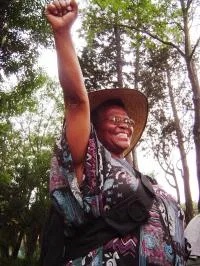
Sizani Ngubane
The Alliance for Rural Democracy, South Africa, announced today that the Traditional Courts Bill is dead: “The Traditional Courts Bill (TCB) is dead. This follows years of opposition from civil society and is a massive victory for the thousands of people in rural parts of the country who spoke out against the bill during provincial public hearings … Women have been at the forefront of opposition to the TCB, arguing that it would legalise and entrench current discrimination.”
The Alliance statement quotes Nomboniso Gasa, of the Alliance for Rural Democracy and the Centre for Law and Society, University of Cape Town, and Sizani Ngubane: “Sizani Ngubane of the Rural Women’s Movement in KZN states: `The TCB was never about custom. It was about bolstering the power of chiefs. Government can no longer deny the abuses that many chiefs are getting away with, because we explained these abuses over and over again in the public hearings. What we need now is a law that protects real custom and protects women, especially, against the kinds of autocratic power that chiefs got used to under apartheid.’”
Many other women, and women’s organizations, contributed to the death of the Traditional Courts Bill. The Women’s Legal Centre has worked tirelessly in the courts. Siyasanga Mazinyo, of the Rural People’s Movement, has been organizing and representing tirelessly across the provinces. And Aninka Claasens has been researching and writing tirelessly on the implications and injustices of the bill.
For decades, Sizani Ngubane has been speaking out, organizing, researching, writing with rural women initially in KwaZulu Natal, and then across South Africa. She founded the Rural Women’s Movement in 1998, which later became the National Movement of Rural Women.
In 1999, Sizani Ngubane met with women across the rural expanse of KwaZulu Natal. She was conducting research about the situation of women and the prospects for organizing a women’s movement. Here’s her conclusion: “Although no longer constitutionally defined as minors in the law of the country …women continue to be treated as subordinates to men; this subordination is defended by many (including some women) in the name of `African culture’ … As a result of the gendered division of labour in the communities, women carry much of the responsibility associated with food production … Women also carry the burden of responsibility for maintaining the household, energy and water collection and childcare. As a result women have less time to develop themselves as individuals or as groups. The prime constraint women face is the absence of a strong lobby campaigning for women’s land rights in rural areas … Organizing women around the land their needs is central to meaningful land reform: that process must begin now.”
The Traditional Courts Bill is dead. Long live Sizani Ngubane and all the women who killed it!
(Photo Credit: International Alliance of Women)
